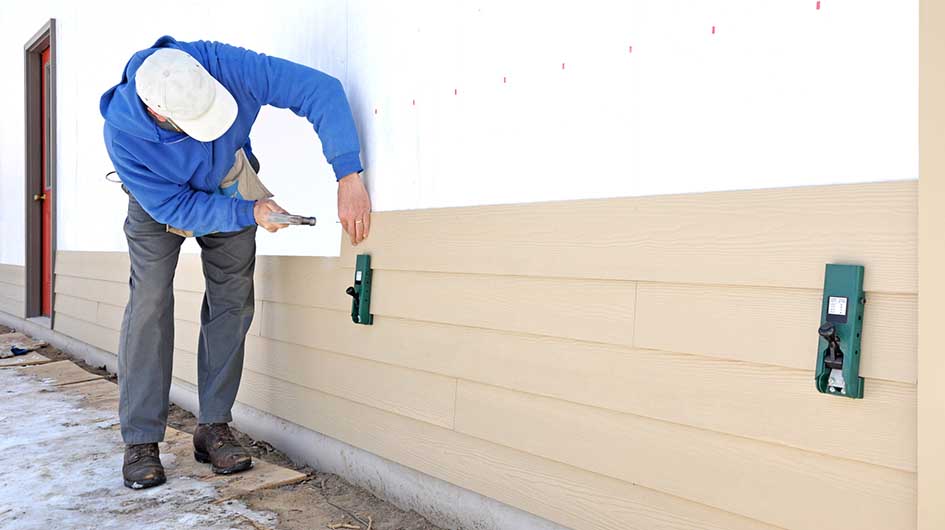Getting new siding for the home is an exciting time for homeowners. It’s a chance to consider a completely new material, change the aesthetic appearance of the home, and possibly save money in the future with improved energy efficiency and weather protection. However, siding is only as good as its installation. Improperly installed siding can lead to significant costs and damage to your home, which is why choosing the right siding contractor is critical for your home siding project.
Choosing the right contractors is as much an art as it is a science that goes beyond comparing prices, though the cost is important too. A bad contractor or one that is inexperienced with the siding material you choose can void your warranty at the least and leave your home unprotected against outside elements at the worst. For these reasons and more, it’s important that evaluate whom to choose as your siding contractor as closely as you would any other professional.
Besides checking their online reputation and consulting with family and friends, there are a few other ways to verify if the siding contractor you’re considering is the right one for you.
What to Look for in a Siding Contractor?
The two most important things to consider when choosing the right siding contractor are their qualifications and how they run their business. To that end, we have put together the top ten questions to ask to separate the qualified from the unqualified.
What are the Full Details of the Company?
It’s important to ask for and receive the full name and address of the company. If they give a P.O. Box, take the time to ask for the full street address. Not only does having a physical address contribute to the likelihood of them being legitimate, but it also allows for better customer service and response times.
Do They Have Insurance?
Professional siding contractors should have at least comprehensive general liability coverage along with worker’s compensation insurance. Having these two ensures that as a homeowner, you’re protected in case damage to the home or property occurs during installation. In addition, if a worker gets injured and the contractor doesn’t cover worker injury it could be you and your insurance liable for the medical bills. Make sure to ask for specific proof of coverage and review the terms so you remain as informed as possible.
Are They Licensed?
This is to verify if the contractors are licensed by the state and/or city. Keep in mind that not all states require licensing, but chances are that written exam or something similar was required for them to legally provide contractors services. Check local and state guidelines to verify the contractor is in compliance. In addition, a business license is not the same as being licensed as a contractor so be sure to have the contractor provide both proofs.
Are they Credentialed?
One of the best ways to ensure you’re selecting a qualified and trained contractor is to check their credentials. This includes ongoing training, certifications, and other symbols of expertise that go beyond just being a contractor. If they only have credentials from manufacturer-sponsored programs it may be a possible red flag, as those programs are more concerned with sales than actual installation practices.
How Long Have They Been in Business?
The longer a company has been in business, the more likely they are to have a steady business backed by experienced and qualified contractors. While new companies are still valid options to consider, it’s important to remember that they need to be able to prove their worth in other ways before giving them a chance.
Do They Have or Provide Referrals?
Just like you wouldn’t hire an employee without references, you don’t want to hire a contractor without doing the same. Get from them a list of ten names and numbers along with photos of previously completed work. This allows you a chance to see how they do before you commit. A company that doesn’t have or won’t provide referrals is one you should consider staying away from.
Is There a Workmanship Warranty?
In general, there are two warranties. One is the manufacturer’s warranty, which covers the siding material against defects in manufacturing. The other is a workmanship warranty*. This is provided by the contractor and is a measure of protection against installation problems. Basically, a contractor should be willing to back up his/her work with a warranty. In addition to the length of warranty period, consider the intent and ability of the contractor to fulfill the terms of the warranty. It doesn’t help you if they are incapable of fixing the problem or leave the warranty open-ended enough to not be liable to fix anything.
How Do They Handle Customer Complaints?
Not usually a category that people think of, but is extremely important. No company that has been around for a length of time exists without a dispute occurring. The key is how did the company handle the dispute? If the dispute was resolved amicably then it’s a good sign that the company strives to do their best by their customers. If they have ever had their license suspended, or the matter went to court, it’s a potential red flag and should be investigated accordingly.
Do They Employ Their Installers or Subcontract?
Many siding companies are qualified and are led by a team of equally qualified contractors as their leaders. However, many of them also like to subcontract their work. It saves the company money and allows them to not have to maintain a large employee base. However, subcontractors are rarely as qualified and the installation quality may be found lacking. Take the time to verify if the company employs its own contractors or if they subcontract. At the very least, they should be willing and capable of closely managing the crew they contract out.
What Type of Siding Are They Experienced With?
Sometimes, you can find a siding contractor that checks off all the right boxes and is perfectly qualified, however, they’re still a bad choice for you to consider. This is usually thanks to the siding material you choose. For example, a siding contractor may be experienced with vinyl or steel siding, but not know the first thing about fiber cement siding. Take the time to explore their specialties to ensure that when it comes time to do the job, there’s no question of their capabilities.
It’s true that a contractor that meets or exceeds the standards set by the questions above, but it’s also true that with this kind of work you get what you pay for. With a truly qualified siding contractor, you may pay more upfront, but benefit from savings down the road thanks to the quality of your installation.
Managing Costs
In general, new siding installations cost between $15,000-$45,000 for residential customers. The material chosen, the size of the home, the architecture of the home, and your geography all play a role in determining where you fall in that range. Besides those factors, labor is the single biggest indicator of how much your siding installation will cost. When choosing the right siding contractor, it is important that they are well-qualified, but it’s also equally as important that they’re able to match your budget without sacrificing quality. When choosing your contractor it’s important to consider how much they cost, and how well you can manage those costs. Many contractors also make use of technology to manage costs and the entire construction process. Ask your contractor what type of construction management software they use for job management.
The good news is that installation estimates usually has the labor already included making the price neat and tidy for your review. The labor is charged by the square foot and is modified according to the material you choose. The heavier the siding, the more workers needed to safely and effectively install the siding. Sometimes, contractors may charge labor separately. Carefully review what the estimate covers and what is considered extra when reviewing the quote.
We have also included some tips for how to manage your costs from start to finish below.
- On-Site Visit: Never accept an estimate or guarantee bid without the companies first performing an onsite visit. The contractor should inspect your home, take measurements, be aware of any architectural challenges, and have the opportunity to advise on how well a particular material will perform. This is your chance to ask questions and get a feel for how easy the contractor will be to work with.
- Written Estimate: Never trust a verbal estimate. Make sure absolutely everything is written down and provided to you. Carefully watch for hidden fees, add-ons, or anything that would be considered extra i.e. removal of old siding. Careful analysis now can save you hundreds later.
- Estimate Review: There should be at least three estimates from three different companies by the time you’re ready for this step. Match up the estimate to the answers you received along with verification of their references and past work. One contractor may have the best price, but not offer something you need making them an unsuitable choice. Carefully weigh the quotes to get the best value, not just the best price.
Labor costs are high for good reason. It takes work and time to get the job done and contractors should be compensated for this. However, you can manage the total costs by taking on some tasks yourself to save time and effort thereby reducing the impact to your budget.
Some things you can do:
- Trim or tie back trees close to the house. This creates a workspace and saves the contractor a step in their prep.
- Mow the lawn. Shorter grass makes it easier to walk across and also makes finding loose nails and staples easier.
- Clear the work zone. Items like patio furniture, plants, and more only serve to get in the way and add to frustration levels. Remove them for the work area and watch the contractors fly through their work.
As a final tip, make sure to clarify the terms of the warranty. The warranties should protect you from adverse problems and lessen the financial burden. It’s important to understand what the warranty covers, what invalidates it, and what you’re actually getting. Generally, the more expensive the warranty the longer it’s valid for. Still, take the time to review and ask questions. A proper warranty provided by a qualified contractor will save you thousands in the future.
Conclusion: Choosing the Right Siding Contractor
There’s no doubt about it. Choosing your siding contractor can be a lot of work, but it’s not an impossible job and more than worth the time invested. Gauge their quality of work, expertise with siding materials, and their overall professionalism and more than half the job is done. Besides the contractor, you can make it easier on yourself by sticking to high-quality products thereby ensuring that your next siding installation is a success.
Keep one thing in mind. If you’re not getting a good feeling about the contractor, then they’re not the right one for you. Always go with your gut when it comes to bad feelings. If they won’t answer your questions or can’t provide proof of certification or licensing, then walk away and find a different contractor. Siding installation is not a project that you’d want to compromise on quality, so don’t be tempted to hire an unqualified contractor that might wind up costing you much more for shoddy work.
Please don’t hesitate to get in touch if you have any questions about choosing the right siding contractor for your house.
*ask us for details on our Lifetime Workmanship Warranty

